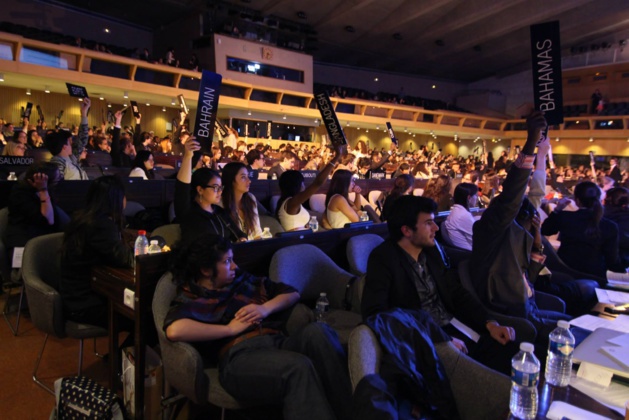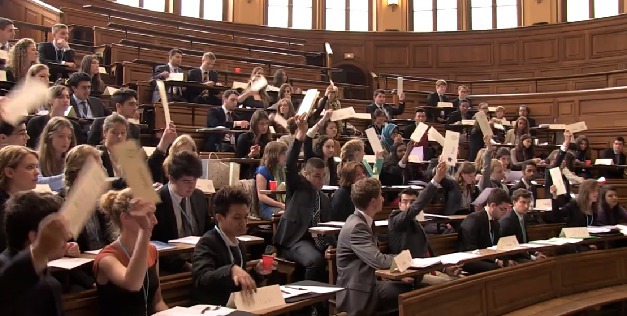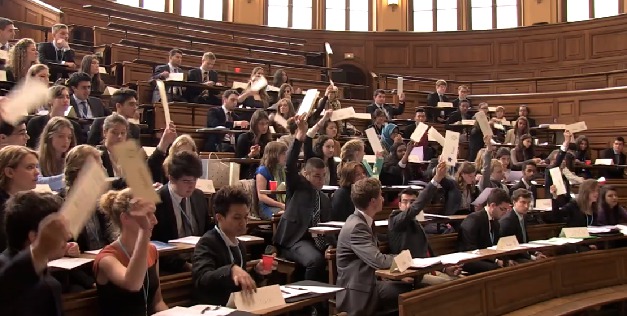
Credits PIMUN
PIMUN was created in 2012. It managed to impose itself in no time as one of the most important simulation of the United Nations’ debates in France and in the world. 2015’s edition brings a cross-disciplinary subject and appears promising. The delegates, who are candidates assuming the role of diplomats, will defend their opinion as if they were debating in the United Nations Headquarters.
PIMUN in brief
The press conference presenting PIMUN on last April 11th was held in a place charged with a strong symbolism : the « hôtel de la Trémoille », residence of the Serbian ambassador, between the Trocadero and the Eiffel Tower. In a city where toponymy and monuments reflect a conflicting past, the well-off building faces the Lady of Iron and the austere palace, erected respectively during the universal exhibits of 1889 and 1937, major events during which the human kind held hands with a peaceful momentum to work together. Indeed, 800 young delegates gathered since yesterday will have to exercise with an open ear, an open mind, and a team spirit.
The fourth Parisian edition will focus on the following topic : interdependence for decision making : peace, diversity, and responsibility. Although committed to success, it takes place in a context in which these kinds of events multiply quickly, even more in French speaking countries. In past years, such demonstrations used to happen in English speaking lands. The most prestigious, the National Model United Nations (NMUN), is held every year in New York and ends with a session in the meeting room of the United Nations General Assembly.
President of PIMUN 2015 Hana Hudak explains : “ Presidents of French universities such as Paris 3 Sorbonne-Nouvelle, where I am currently studying, support more and more the organization of the Model United Nations (MUN), whether directly or not. Simulations will partly take place within the university’s buildings, and I’m taking a class about the upgrading of associative experiences that acknowledges my devotion. Although the first edition was in 2012, Paris’s is one of the most important” she adds. Words susbstantiated by the fact some sessions will operate at the UN Headquarters for education, science and culture (UNESCO), in the 7th district of the capital.
PIMUN : how does it work ?
The Models of United Nations are direct descendants of the simulations already initiated since the birth of the League of Nations in 1919, though it was shut down in 1946. However, these are managed by strict rules.

First of all, each delegate represents a different country from where they are from. This forces them to assume a new role and sometimes to discover and defend opinions other than their own. Moreover, those fictional characters speak in the name of real jurisdictions, programs, and funds part of the UN : General Secretary, General Assembly, Security Council, the United Nations Conference on Trade and Development (UNCTAD), the UN Development Program (UNDP)… Finally, they have to respect a decorum, a code of conduct, and get fully involved : dress professionally, have a respectful attitude towards the others, respect schedules, etc.
The demonstration proceeds at a steady pace. It requires a certain devotion even before the beginning of PIMUN. Also students were asked to hand in a position paper, a document that summarizes the different opinions they will defend during the negotiations. Days of simulation are pretty similar to office schedules. 800 young people express their point of view from 9 to 12 am and from 2 to 5 pm, which is more exhausting when English is not their mother tongue. However, there is no competition in here. Even though the best speakers will be given a prize on Sunday, all the participants will receive a certificate for their devotion to PIMUN 2015.
The simulation is open for all students, as long as they are passionate about international relations and able to speak English. Jan Lebendig, member of the Secretary of PIMUN 2015 claims : “ There is no need to have graduated in international affairs to be part of the event. If we come to speak about humanitarian issues or development, a doctor and an agronomist can both share their knowledge.”
PIMUN affirm its position as a serious demonstration, that requires a good sense of involvement from students. It is a good opportunity to share opinions about worldwide problems. It remains most importantly “ a great way to meet people from different places, and to discover Paris for those who come from afar,” Jan Lebending highlights.





























